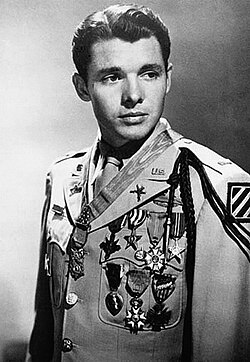Audie L. Murphy | |
|---|---|
 Audie Murphy in full dress U. S. Army uniform | |
| Born | 20 June 1925 Kingston, Hunt County, Texas, U.S. |
| Died | 28 May 1971 (aged 45) Brush Mountain, near Catawba, Virginia, U.S. |
| Buried | |
| Allegiance | United States |
| Service | |
| Years of service |
|
| Rank |
|
| Service number | |
| Unit |
|
| Battles / wars | |
| Awards |
|
| Other work | Actor; songwriter |
| Signature |  |
| Website | Audie L. Murphy |
The military career of Audie Murphy (20 June 1925 – 28 May 1971) encompassed two separate careers. His U. S. Army service covered nine World War II campaigns fought by the 3rd Infantry Division: Tunisia, Sicily, Naples-Foggia, Anzio, Rome-Arno, Southern France, Ardennes-Alsace, Rhineland and Central Europe. He lied about his age to enlist in the United States Army in 1942.[3] Before his 20th birthday he had earned every Army combat award for valor available during his period of service[a] and had risen to the rank of first lieutenant. On the day he was awarded the Medal of Honor for his January 1945 actions at the Colmar Pocket in France, he was considered to be America's most decorated World War II soldier and received national recognition as such when Life magazine made him their cover story. He has been described as the most highly decorated soldier in U.S. history.[4][5]
His superior officers, as well as the Speaker of the U. S. House of Representatives, encouraged him to apply for enrollment at West Point and offered to provide any assistance and influence needed to help him be accepted as a cadet. Murphy eventually passed on the opportunity of enrollment at West Point, in part because of limitations resulting from his war injuries. At the end of his active Army service, he was given 50 percent disability classification and transferred to the Officers' Reserve Corps. The psychological effects of the war remained with him for the rest of his life in the form of combat stress. Although the military did little for Murphy's post-war stress, he was publicly forthcoming about it in hopes of prodding the government into providing better treatment and medical benefits for other veterans suffering the same issues.
At the 1950 onset of the Korean War, Murphy was commissioned[6] with the rank of captain in the 36th Infantry Division of the Texas National Guard. He was charged with training new recruits and fully believed that he and the 36th would be sent to the Korean front for combat duty. His film career began to take off in 1951, limiting Murphy's Guard involvement. The Korean Armistice Agreement of 1953 ended hostilities without the 36th ever being sent to Korea. Murphy, however, remained with the Guard actively participating in recruitment drives and allowing his name and image to be used for that purpose. He retired with the rank of major in 1966 and was transferred to the United States Army Reserve. In 1969 the Army transferred him to Retired Reserve. For his combined service in the Army and the Guard, his home state posthumously awarded Murphy the Texas Legislative Medal of Honor.
- ^ a b Reyna, Charmaine (25 January 2013). "Lead From The Front: Sergeant Audie Murphy Study Guide" (PDF). Fort Lee. pp. 20–21. Archived from the original (PDF) on 22 December 2016. Retrieved 5 March 2017.
- ^ Audie Murphy's Medal of Honor citation (War Department GO 45, 9 August 1945)
- ^ Smith 2015, pp. 1, 12–13, 120, 217.
- ^ Graham 1989, p. 101.
- ^ "Audie Leon Murphy". Association of the United States Army. 22 June 2016. Retrieved 23 January 2024.
- ^ commissioning paperwork
Cite error: There are <ref group=lower-alpha> tags or {{efn}} templates on this page, but the references will not show without a {{reflist|group=lower-alpha}} template or {{notelist}} template (see the help page).